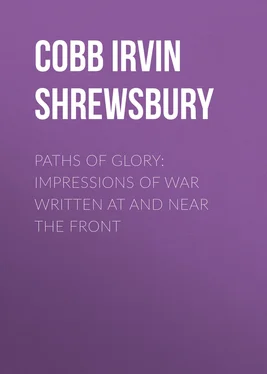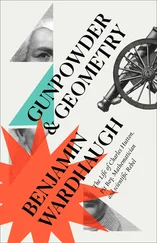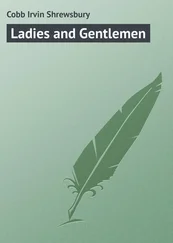Irvin Cobb - Paths of Glory - Impressions of War Written at and Near the Front
Здесь есть возможность читать онлайн «Irvin Cobb - Paths of Glory - Impressions of War Written at and Near the Front» — ознакомительный отрывок электронной книги совершенно бесплатно, а после прочтения отрывка купить полную версию. В некоторых случаях можно слушать аудио, скачать через торрент в формате fb2 и присутствует краткое содержание. Жанр: prose_military, История, foreign_edu, foreign_antique, foreign_prose, на английском языке. Описание произведения, (предисловие) а так же отзывы посетителей доступны на портале библиотеки ЛибКат.
- Название:Paths of Glory: Impressions of War Written at and Near the Front
- Автор:
- Жанр:
- Год:неизвестен
- ISBN:нет данных
- Рейтинг книги:3 / 5. Голосов: 1
-
Избранное:Добавить в избранное
- Отзывы:
-
Ваша оценка:
- 60
- 1
- 2
- 3
- 4
- 5
Paths of Glory: Impressions of War Written at and Near the Front: краткое содержание, описание и аннотация
Предлагаем к чтению аннотацию, описание, краткое содержание или предисловие (зависит от того, что написал сам автор книги «Paths of Glory: Impressions of War Written at and Near the Front»). Если вы не нашли необходимую информацию о книге — напишите в комментариях, мы постараемся отыскать её.
Paths of Glory: Impressions of War Written at and Near the Front — читать онлайн ознакомительный отрывок
Ниже представлен текст книги, разбитый по страницам. Система сохранения места последней прочитанной страницы, позволяет с удобством читать онлайн бесплатно книгу «Paths of Glory: Impressions of War Written at and Near the Front», без необходимости каждый раз заново искать на чём Вы остановились. Поставьте закладку, и сможете в любой момент перейти на страницу, на которой закончили чтение.
Интервал:
Закладка:
Once, as a cook perched on a step at the back of his wagon bent forward to stir the stew with a spoon almost big enough for a spade, I saw under his hiked-up coat-tails that at the back of his gray trousers there were four suspender buttons in a row instead of two. The purpose of this was plain: when his suspenders chafed him he might, by shifting the straps to different buttons, shift the strain on his shoulders. All German soldiers' trousers have this extra garnishment of buttons aft.
Somebody thought of that. Somebody thought of everything.
We in America are accustomed to think of the Germans as an obese race, swinging big paunches in front of them; but in that army the only fat men we saw were officers, and not so many of them. On occasion, some colonel, beefy as a brisket and with rolls of fat on the back of his close-shaved neck, would be seen bouncing by, balancing his tired stomach on his saddle pommel; but, without exception, the men in the ranks were trained down and fine drawn. They bent forward under the weight of their knapsacks and blanket rolls; and their middles were bulky with cartridge belts, and bulging pockets covered their flanks.
Inside the shapeless uniforms, however, their limbs swung with athletic freedom, and even at the fag-end of a hard day's marching, with perhaps several hours of marching yet ahead of them, they carried their heavy guns as though those guns were toys. Their fair sunburned faces were lined with sweat marks and masked under dust, and doubtless some were desperately weary; but I did not see a straggler. To date I presume I have seen upward of a million of these German soldiers on the march, and I have yet to see a straggler.
For the most part the rank and file were stamped by their faces and their limbs as being of peasant blood or of the petty artisan type; but here and there, along with the butcher and the baker and the candlestick maker, passed one of a slenderer build, usually spectacled and wearing, even in this employment, the unmistakable look of the cultured, scholarly man.
And every other man, regardless of his breed, held a cheap cigar between his front teeth; but the wagon drivers and many of the cavalrymen smoked pipes—the long-stemmed, china-bowled pipe, which the German loves. The column moved beneath a smoke-wreath of its own making.
The thing, however, which struck one most forcibly was the absolute completeness, the perfect uniformity, of the whole scheme. Any man's equipment was identically like any other man's equipment. Every drinking cup dangled behind its owner's spine-tip at precisely the same angle; every strap and every buckle matched. These Germans had been run through a mold and they had all come out soldiers. And, barring a few general officers, they were all young men—men yet on the sunny side of thirty. Later we were to see plenty of older men—reserves and Landwehr—but this was the pick of the western line that passed through Louvain, the chosen product of the active wing of the service.
Out of the narrow streets the marchers issued; and as they reached the broader space before the town hall each company would raise a song, beating with its heavy boots on the paving stones to mark the time. Presently we detected a mutter of resentment rising from the troops; and seeking the cause of this we discerned that some of them had caught sight of a big Belgian flag which whipped in the breeze from the top of the Church of Saint Pierre. However, the flag stayed where it had been put during the three days we remained in Louvain. Seemingly the German commander did not greatly care whose flag flew on the church tower overhead so long as he held dominion of the earth below and the dwellers thereof.
Well, we watched the gray ear-wig wriggling away to the westward until we were surfeited, and then we set about finding a place where we might rest our dizzy heads. We could not get near the principal hotels. These already were filled with high officers and ringed about with sentries; but half a mile away, on the plaza fronting the main railroad station, we finally secured accommodations—such as they were—at a small fourth- rate hotel.
It called itself by a gorgeous title—it was the House of the Thousand Columns, which was as true a saying as though it had been named the House of the One Column; for it had neither one column nor a thousand, but only a small, dingy beer bar below and some ten dismal living rooms above. Established here, we set about getting in touch with the German higher-ups, since we were likely to be mistaken for Englishmen, which would be embarrassing certainly, and might even be painful. At the hotel next door—for all the buildings flanking this square were hotels of a sort—we found a group of officers.
One of them, a tall, handsome, magnetic chap, with a big, deep laugh and a most beautiful command of our own tongue, turned out to be a captain on the general staff. It seemed to him the greatest joke in the world that four American correspondents should come looking for war in a taxicab, and should find it too. He beat himself on his flanks in the excess of his joy, and called up half a dozen friends to hear the amazing tale; and they enjoyed it too.
He said he felt sure his adjutant would appreciate the joke; and, as incidentally his adjutant was the person in all the world we wanted most just then to see, we went with him to headquarters, which was a mile away in the local Palais de Justice—or, as we should say in America, the courthouse. By now it was good and dark; and as no street lamps burned we walked through a street that was like a tunnel for blackness.
The roadway was full of infantry still pressing forward to a camping place somewhere beyond the town. We could just make out the shadowy shapes of the men, but their feet made a noise like thunderclaps, and they sang a German marching song with a splendid lilt and swing to it.
"Just listen!" said the captain proudly. "They are always like that— they march all day and half the night, and never do they grow weary. They are in fine spirits—our men. And we can hardly hold them back. They will go forward—always forward!
"In this war we have no such command as Retreat! That word we have blotted out. Either we shall go forward or we shall die! We do not expect to fall back, ever. The men know this; and if our generals would but let them they would run to Paris instead of walking there."
I think it was not altogether through vainglory he spoke. He was not a bombastic sort. I think he voiced the intent of the army to which he belonged.
At the Palais de Justice the adjutant was not to be seen; so our guide volunteered to write a note of introduction for us. Standing in a doorway of the building, where a light burned, he opened a small flat leather pack that swung from his belt, along with the excellent map of Belgium inclosed in a leather frame which every German officer carried. We marveled that the pack contained pencils, pens, inkpot, seals, officially stamped envelopes and note paper, and blank forms of various devices. Verily these Germans had remembered all things and forgotten nothing. I said that to myself mentally at the moment; nor have I had reason since to withdraw or qualify the remark.
The next morning I saw the adjutant, whose name was Renner and whose title was that of major; but first I, as spokesman, underwent a search for hidden weapons at the hands of a secret service man. Major Renner was most courteous; also he was amused to hear the details of our taxicabbing expedition into his lines. But of the desire which lay nearest our hearts–to get back to Brussels in time haply to witness its occupation by the Germans—he would not hear.
"For your own sakes," thus he explained it, "I dare not let you gentlemen go. Terrible things have happened. Last night a colonel of infantry was murdered while he was asleep; and I have just heard that fifteen of our soldiers had their throats cut, also as they slept. From houses our troops have been fired on, and between here and Brussels there has been much of this guerrilla warfare on us. To those who do such things and to those who protect them we show no mercy. We shoot them on the spot and burn their houses to the ground.
Читать дальшеИнтервал:
Закладка:
Похожие книги на «Paths of Glory: Impressions of War Written at and Near the Front»
Представляем Вашему вниманию похожие книги на «Paths of Glory: Impressions of War Written at and Near the Front» списком для выбора. Мы отобрали схожую по названию и смыслу литературу в надежде предоставить читателям больше вариантов отыскать новые, интересные, ещё непрочитанные произведения.
Обсуждение, отзывы о книге «Paths of Glory: Impressions of War Written at and Near the Front» и просто собственные мнения читателей. Оставьте ваши комментарии, напишите, что Вы думаете о произведении, его смысле или главных героях. Укажите что конкретно понравилось, а что нет, и почему Вы так считаете.












